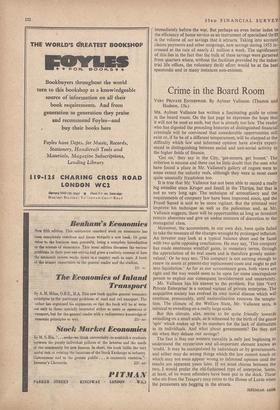Crime in the Board Room
MR. Aylmer Valiance has written a fascinating guide to crime in the board room. On the last page he expresses the hope that it will not be used as such, but that is already too late. The reader who has digested the preceding histories of distinguished financial criminals will be convinced that considerable opportunities still exist or, if he be of a different temperament, will be alarmed at the difficulty which law and informed opinion have always experi- enced in distinguishing between social and anti-social activity in the higher fields of finance.
'Get on,' they say in the City, 'get-onners, get honest.' The criterion is success and there can be little doubt that the men who have found a place in Mr. Vallance's gallery of rogues were to some extent the unlucky ones, although they were in most cases quite unusually fraudulent too.
It is true that Mr. Valiance has not been able to record a really big swindler since Kruger and Insull in the Thirties, but that is not so very long ago. The technique of accountancy and the requirements of company law have been improved since, apd the Fraud Squad is said to be more vigilant. But the criminal may improve his technique as well as the policeman and, as Mr. Valiance suggests, there will be opportunities as long as investors remain absentees and give an undue measure of discretion to the managerial class.
Moreover, the accountants, in our own day, have quite failed to take the measure of the changes wrought by prolonged inflation. An investor may look at a typical balance sheet and be faced with two quite opposing conclusions. He may say, `This company has made enormous windfall gains, in monetary terms, through the appreciation of its real assets and is therefore grossly under- valued.' Or he may say, 'This company is not earning enough to ; renew its assets at present-day replacement costs and ought to put into liquidation.' As far as our accountancy goes, both views are right and the way would seem to be open for some unscrupulous person to exploit our consequent bewilderment and uncertainty. -,
Mr. Valiance has his answer to the problem. For him 'Very Private Enterprise' 'is a normal variant of private enterprise. The acquisitive society has evolved its own moral disease which will continue, presumably, until nationalisation removes the tempta- tion. The climate of the Welfare State, Mr. Valiance says, is 1 inimical to swindling on a really large scale.
But this climate, alas, seems to be quite friendly towards swindling on a small scale, as is witnessed by the birth of the genus 'spiv' which makes up by its numbers for the lack of distinction in its individuals. And what about governments? Do they not 7 sin when they debase our savings?
The fact is that our western morality is only just beginning to understand the mysterious and all-important element known as `credit.' It may be manipulated by individuals or by governments, and either may do wrong things which the law cannot touch or which may not even appear wrong to informed opinion until the results are apparent years later. If we must choose between the two, I would prefer the old-fashioned type of enterprise. Some, at least, of its worst offenders have been put in the dock. Those who sin from the Treapury may retire to the House of Lords when the pensioners are begging in the streets.
3E,REM1AH ASH'S


















































 Previous page
Previous page